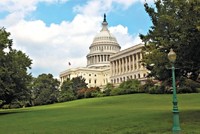Advertisement
Grab your lab coat. Let's get started
Welcome!
Welcome!
Create an account below to get 6 C&EN articles per month, receive newsletters and more - all free.
It seems this is your first time logging in online. Please enter the following information to continue.
As an ACS member you automatically get access to this site. All we need is few more details to create your reading experience.
Not you? Sign in with a different account.
Not you? Sign in with a different account.
ERROR 1
ERROR 1
ERROR 2
ERROR 2
ERROR 2
ERROR 2
ERROR 2
Password and Confirm password must match.
If you have an ACS member number, please enter it here so we can link this account to your membership. (optional)
ERROR 2
ACS values your privacy. By submitting your information, you are gaining access to C&EN and subscribing to our weekly newsletter. We use the information you provide to make your reading experience better, and we will never sell your data to third party members.
ACS News
ACS updates policy statements on energy and water
The changes focus on sustainable energy and reframe water access as a human right
by Alexandra A. Taylor
February 13, 2022
| A version of this story appeared in
Volume 100, Issue 6

Energy and water are resources many people take for granted. But increasingly in the US, dry climates, aging infrastructure, and extreme weather events mean energy and water access is insufficient to meet people’s needs.
The resources are closely linked: water is used to generate energy, and energy is needed to clean and distribute water.
The American Chemical Society has updated its policy statements on energy and water. The “Energy Policy” statement has been revised with a focus on sustainable energy production and issues of equity in energy production and infrastructure. The updated “Water Treatment and Conservation” policy statement looks at water access as a human right and focuses on ensuring that water infrastructure is managed equitably throughout the US.
ACS’s Committees on Environmental Improvement (CEI), Science, and Corporation Associates jointly updated the energy statement. CEI worked alone to update the water statement.
“There is no one single energy technology that’s reliable, affordable, clean, and secure for everyone,” says Elise Fox, chair of CEI. “We need to strive toward finding a mix of energy uses that will work best and provide everyone with reliable and clean energy.” Fox says the updated statements reflect an effort by ACS to advance both the United Nations’ sustainable development goals and environmental equity. “For water treatment and comfort conservation, it’s really important for us to strive toward modernized water infrastructure so that we can provide equitable access to safe and clean water.”
ACS’s policy statements summarize the society’s official positions on important issues. ACS committees develop the statements with input from members. Statements that are approved by the ACS Board of Directors are active for 3 years. After this point, they are renewed or retired.
ACS currently has 27 policy statements in the areas of fostering innovation through research and technology, strengthening science education and the scientific workforce, advancing sustainability and the environment, and promoting science in the public policy arena.
In addition to updating the energy and water statements, the society renewed four statements without changes. They are “US Innovation and Entrepreneurship,” “Disabilities,” “The Science and Technology of Hydraulic Fracturing,” and “Preventing the Reemergence of Chemical Weapons.”
In related news, the society released its 2022 public policy agenda on Feb. 1. ACS is urging Congress and the Joe Biden administration to fund scientific research; promote equitable access to science, technology, engineering, and math education and workforce training; and take bold action on sustainability and climate change mitigation.
ACS members can join the Act4Chemistry legislative action network, participate in their local section government affairs committee, and enroll in the ACS Chemistry Advocacy Workshop. They can also offer input on statements up for revision. For more information, visit www.acs.org/policy.
ACS policy statements
Foster Innovation through Research and Technology
“Energy Policy”: Endorses an energy policy that prioritizes energy efficiency and that includes the full life-cycle costs of energy sources in their market prices, including the impacts on human health and the environment. It also encourages long-term orientation for both funding and incentives.
“Intellectual Property”: Encourages policies that improve the quality and consistency of granted patents, as well as the efficiency of the patent process. Urges policy makers to support information technology upgrades to the Copyright Office, as well as support sustainable open access initiatives. Promotes consistent application of trade secret protections.
“Science and Technology in the Budget”: Urges policy makers to make investments in federal R&D funding to put the US at the forefront of R&D and recommends strategies to ensure federal dollars dedicated to R&D are used as efficiently as possible.
“US Business Climate”: Supports a fair and level playing field that enhances competition and stimulates R&D and supports policies that foster the growth of small R&D businesses and encourage entrepreneurship.
“US Innovation and Entrepreneurship”: Supports investment in a world-class workforce through education and training, long-term commitments to basic research and technology development, and the development of a sustainable infrastructure for innovation and entrepreneurship.
Strengthen Science Education and the Scientific Workforce
“Disabilities”: Supports ratification of the Convention on the Rights of Persons with Disabilities and encourages international cooperation, sharing of scientific knowledge, and R&D on assistive technologies in carrying out the requirement to implement the means for equal access to medical facilities, education, workplaces, and communication technologies.
“Employment Nondiscrimination”: Recommends federal legislation to extend employment discrimination protection to include sexual orientation, gender expression, and gender identity.
“Importance of Hands-On Laboratory Activities”: Supports hands-on activities in education and explores the proper role of computer simulations that mimic laboratory procedures as a useful supplement to them but not a substitute for them.
“Science Education”: Supports ensuring that all students understand science in accordance with national standards; modernizing learning environments; strengthening science, technology, engineering, and mathematics (STEM) teacher education programs; and nurturing students of all backgrounds, including from underrepresented groups, in pursuit of studies and careers in STEM.
“Teaching of Evolution”: Supports teaching of evolution; opposes alternative, nonscientific theories; and urges states and localities to support high-quality science standards and curricula.
“Workforce-Related Immigration”: Encourages continuing visa programs for students and corporations to transfer workers into the US. Supports simplification of employer-sponsored permanent residency for US-educated foreign nationals, and supports revisions to the H1-B visa process.
“Visa Restrictions”: Supports visa policies that facilitate scientific education and exchange and welcome foreign scholars, students, scientists, and engineers. Supports timely and reasonable screening processes for visits, greater transparency of the application process, and the issuance and management of visas that are more aligned with the purpose of academic study and scientific exchange.
Advance Sustainability and the Environment
“Chemical Risk Assessment and Regulatory Decision Making”: Supports risk assessments that are based on sound science, that are protective of human health and the environment, and that include necessary information from the commercial chemical enterprise while protecting confidential business information.
“Climate Change”: Reviews the science and recommends action on greenhouse gas reduction and climate change adaptation strategies. Encourages continued funding for research into the effects of climate change while also emphasizing the importance of educating the public on the issue.
“Critical Materials”: Encourages comprehensive research and workforce development to ensure the sustainable development of domestic supplies. Urges investment in research and development efforts and funding for recovery and recycling of critical materials, and promotes updating US funding mechanisms to support interagency collaboration and outreach.
“Regulation of Laboratory Waste”: Reviews the pitfalls of regulations meant for large-scale chemical manufacturing being applied to laboratories.
“The Science and Technology of Hydraulic Fracturing”: Recommends conducting research on fracking and its impacts from a life-cycle perspective, its uses compared with replacement resources, methane emissions at fracking sites, causes and extent of groundwater contamination, less hazardous fracking fluids, and characterization of and methods for treating and disposing of liquid returns from fracking.
“Sustainability of the Chemistry Enterprise”: Defines the concept of sustainability in the context of the chemistry enterprise. Supports government incentives for sustainable technologies.
“Water Treatment and Conservation”: Supports US government action that develops water-use guidelines and initiatives; encourages advancements in water reduction, treatment, and reuse technologies; protects groundwater resources; and prevents discharge of toxic substances into ground and surface waters.
Science in the Public Policy Arena
“Encouraging Americans to Support Professional and Educational Activities through Financial Donations”: Supports tax deductions for charitable contributions and permanent extension of the Individual Retirement Account charitable rollover provisions.
“Ensuring Access to High-Quality Science”: Supports using sustainable publishing models that provide universal access to scientific research. Supports the 10 principles outlined in the Brussels Declaration on STM Publishing (STM is scientific, technical, and medical), as set forth by the International Association of Scientific, Technical, and Medical Publishers.
“Forensic Science”: Calls for scientific rigor, high-quality education, and standards in forensic science and for its integration with the broader scientific community. Backs evaluation and improvement of forensic analytical methods.
“Peer Review: Ensuring High-Quality Science”: Urges support for scientific peer review processes that evaluate grant applications on the basis of both intellectual merit and broader impacts and that are periodically evaluated for process effectiveness and efficiency and for reviewer freedom from interference in scientific merit assessments.
“Preventing the Reemergence of Chemical Weapons”: Supports efforts to improve chemical safety and security and evaluation of alternative materials. Urges governments to prioritize actions surrounding establishing standards for responsible conduct, and to prevent the use of pharmaceutical compounds as weapons. Further encourages the US to continue the strong support of the Chemical Weapons Convention.
“Safety in the Chemistry Enterprise”: Supports the use of risk-based criteria in creating safety regulations and policies, and continued funding of research to inform policy makers and stakeholders in the creation of those regulations and policies. Also supports government implementation of regulatory policies that foster innovation within a safer chemical environment.
“Scientific Freedom”: Advocates freedom of scientific exchange and stronger scientific collaboration to benefit humankind.
“Scientific Insight and Integrity”: Supports the use of insightful, comprehensive, scientific, and engineering input to the development and evaluation of policy options. Encourages scientific integrity policies that help the federal government obtain and integrate scientific assessments into policy development and implementation.




Join the conversation
Contact the reporter
Submit a Letter to the Editor for publication
Engage with us on Twitter